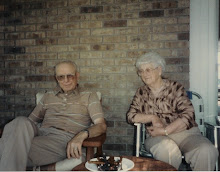When a very small boy my mother took my sister Bertha’s son, Leo Carter, to raise as Bertha had lost her husband, Benjamin Carter, in death when Leo was two years old. We were then raised together for several years. What fun times we had together, I had not had a close brother. My brother Will was seven years older than I. We would sleigh ride down the hill on the crusted snow in the late winter time, then when spring was starting we would tromp the hills to find the first sugar flowers and buttercups and snow drops. Mother had a tin spoon that both of us liked to eat with, and we would quarrel over it, who was going to eat with, the tinun, as we called it. One day my brother Heber said he was going to end that so he took the spoon and bent it up and threw it in the trash. What a tragedy that was. We played threshing machine with our little red wagons, threshing sand, and did many pleasant things together. In later years he married my wife Lona’s sister Mae. So he is now my nephew and my brother-in-law. We have been very close over the years. They moved to California to live and we have made many trips there, almost every year, to see them. We have had some treat times together. They now live in Richfield Utah, this being march 1978.
In 1908 when the Porterville chapel was dedicated by President Joseph F. Smith, President of the Church of Jesus Christ of Latter Day Saints, I was present, being a little over 5 years old. President Smith stood by the door at the close of the meeting and shook hands with all the primary children. The impression and thrill of shaking hands with a Prophet of God has stayed with me all during my life. I have shaken hands with every Prophet President of the church since that time, Spencer W. Kimball is President at this time, 1978. Our birthdays are the same day, 28 March. He is eight years my senior.
In 1919 the boys came home from the war. Will and I worked at home and for our brother –in-law, Frank Porter, until the beets were (sugar beets) harvested, then he and I went to Ogden to work in the sugar factory all winter. It was a cold, nasty winter. Our room had an inch of frost on the walls all winter. I had a joyous time there going to dances and shows. Will was conservative, he was saving money to get married, I spent mine. Will was married in June 1920. That summer I went to Snyderville and helped Mr. Jim Dahl in the hay. It was a hard summer, he was somewhat of a Simon Lagree, and he had a couple of boys that were miserable to work with. In the fall of 1920 I went to work at “the arsenal” near Ogden, they, the government, was building great powder storage magazines. This is now Hill Air Force Base. The winter was cold and windy. The work was hard, pushing wheel barrels full of concrete up schaffolding 20 feet high. I was only 17 years old but was very used to work. (Work has been my whole life, I never learned to play anything except a little base ball). I stood this work quite a while until one morning we were walking up the hill to work, the wind and snow howling around us. Me and another fellow said that was enough, so we went back to the shack and quit. From there I went to Salt Lake. Father and Mother had gone to Salt Lake for the winter to do research work, they were living on 7th south near West Temple. I stayed with them all winter.





